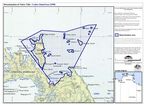 Print this page Print this page | ||
Commonwealth v Yarmirr (2000) 168 ALR 426 (11 October 2001) | ||
| Category: | Case Law | |
| Date: | 11 October 2001 | |
| Sub Category: | Case Law | |
| Place: | Croker Island, north east of Darwin | |
| Click this link to search this location with google maps | ||
| State/Country: | Northern Territory, Australia | |
| Click this link to search this location with google maps | ||
| Alternative Names: | ||
| Subject Matter: | Native Title | |
| URL: | http://www.austlii.edu.au/au/cases/cth/high_ct/2001/56.html | |
| Summary Information: | ||
Between: The Commonwealth of Australia (Appellant) and Mary Yarmirr and Others (Respondents) Judges: Gleeson CJ, Gaudron, McHugh, Gummow, Kirby, Hayne, and Callinan JJ Judgment After a successful native title determination granting non-exclusive rights to the claimants, both parties appealed to the Federal Court and then to the High Court. The Commonwealth appealed to restrict the rights granted over the area and Yarmirr appealed to have the rights include exclusive possession. Non-exclusive native title rights may be recognised over the sea and sea-bed. However, exclusive native title rights would be inconsistent with a number of public and international rights. | ||
| Detailed Information: | ||
Background Mary Yarmirr and others made a native title claim on behalf of the Mandilarri-Ildugij, Mangalarra, Muran, Gadurra, Minaga, Ngayndjagar, and Mayorram Peoples. In this claim, they sought recognition of exclusive and non-exclusive native title rights over an area of sea and sea beds in the Northern Territory around Croker Island north of the Cobourg Peninsula. The area also included the Manburra (Oxley), Guumal (New Year), Gurrbalui (Lawson), Injuranggarn (McCluer), and Wurrulja (Grant) Islands. At trial, it was held that it was possible to recognise native title rights over the sea and sea bed. However, the Court did not recognise a right to exclusive possession. This decision was appealed and upheld by the Full Federal Court, leading both parties to appeal to the High Court. The Commonwealth claimed that native title rights could not extend to the sea. The claimants sought orders granting them exclusive possession of the area, so long as they didn't get in the way of the internatiional right to innocent passage, the public right to navigate, and the rights of fishing licence holders. Judgment The majority of the High Court dismissed the appeals. The Court held that it was not possible to recognise both the public and international rights in the area alongside the native title rights to exclusive possession as the rights were inconsistent. The Court explained that it was not sufficient to make the proposed native title right to exclusive possession subject to these public and international rights. Following Mabo v Queensland (No 2) (1992) 175 CLR 1, the Court held that the inconsistency prevented the native title right to exclusive possession from being claimed over the affected area. The Court also held that no law relating to the territorial sea in inconsistent with recognising native title rights and interests relating to the sea or sea-bed. In dismissing both appeals, the Court reaffirmed the initial determination, holding that non-exclusive native title rights were to be recognised in the inter-tidal zone of the determination area. | ||
| ||||
| ||||
|
Was this useful? Click here to fill in the ATNS survey

 Commonwealth v Yarmirr (2000) 168 ALR 426 (11 October 2001) Map - (
Commonwealth v Yarmirr (2000) 168 ALR 426 (11 October 2001) Map - ( 